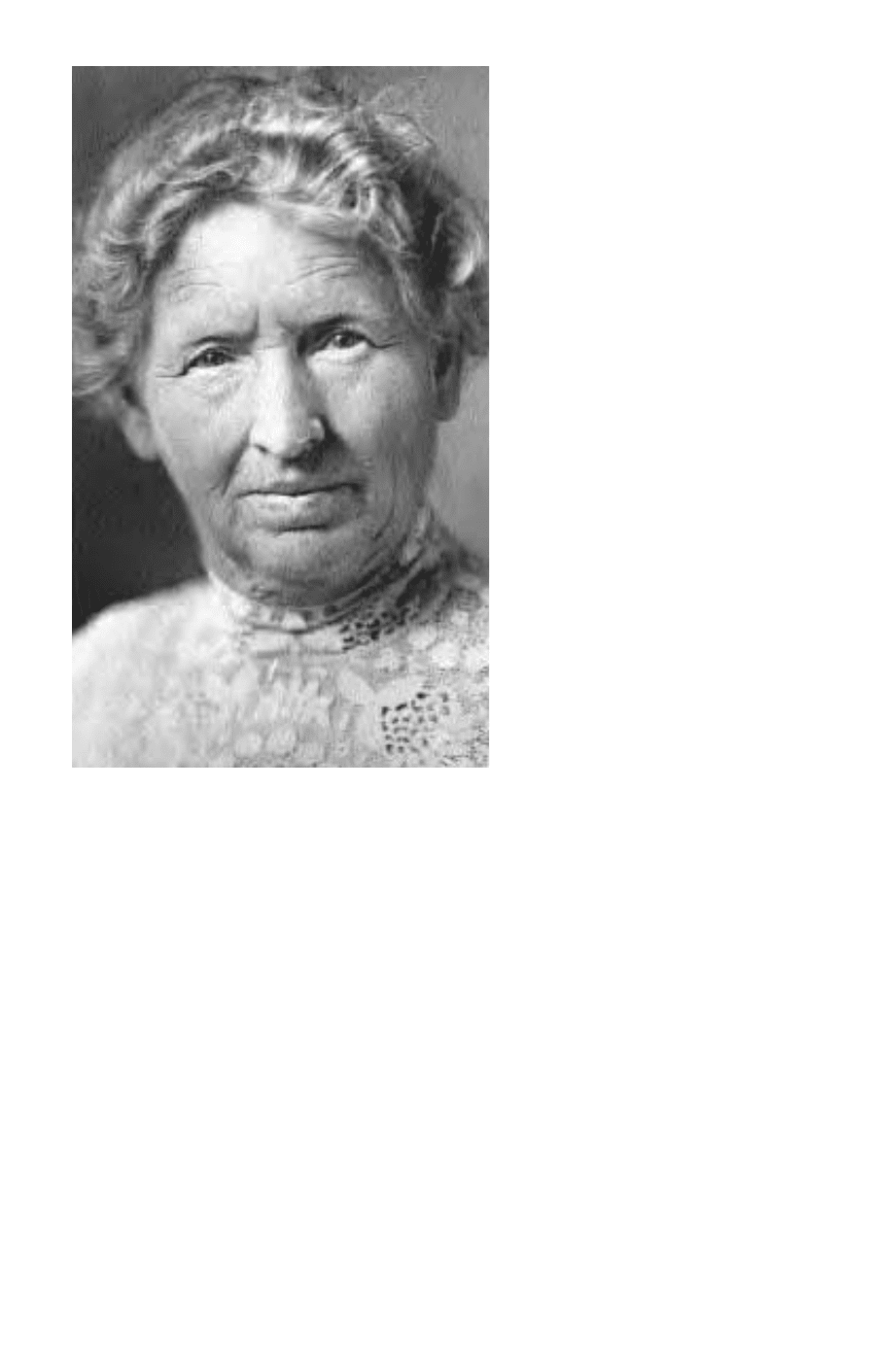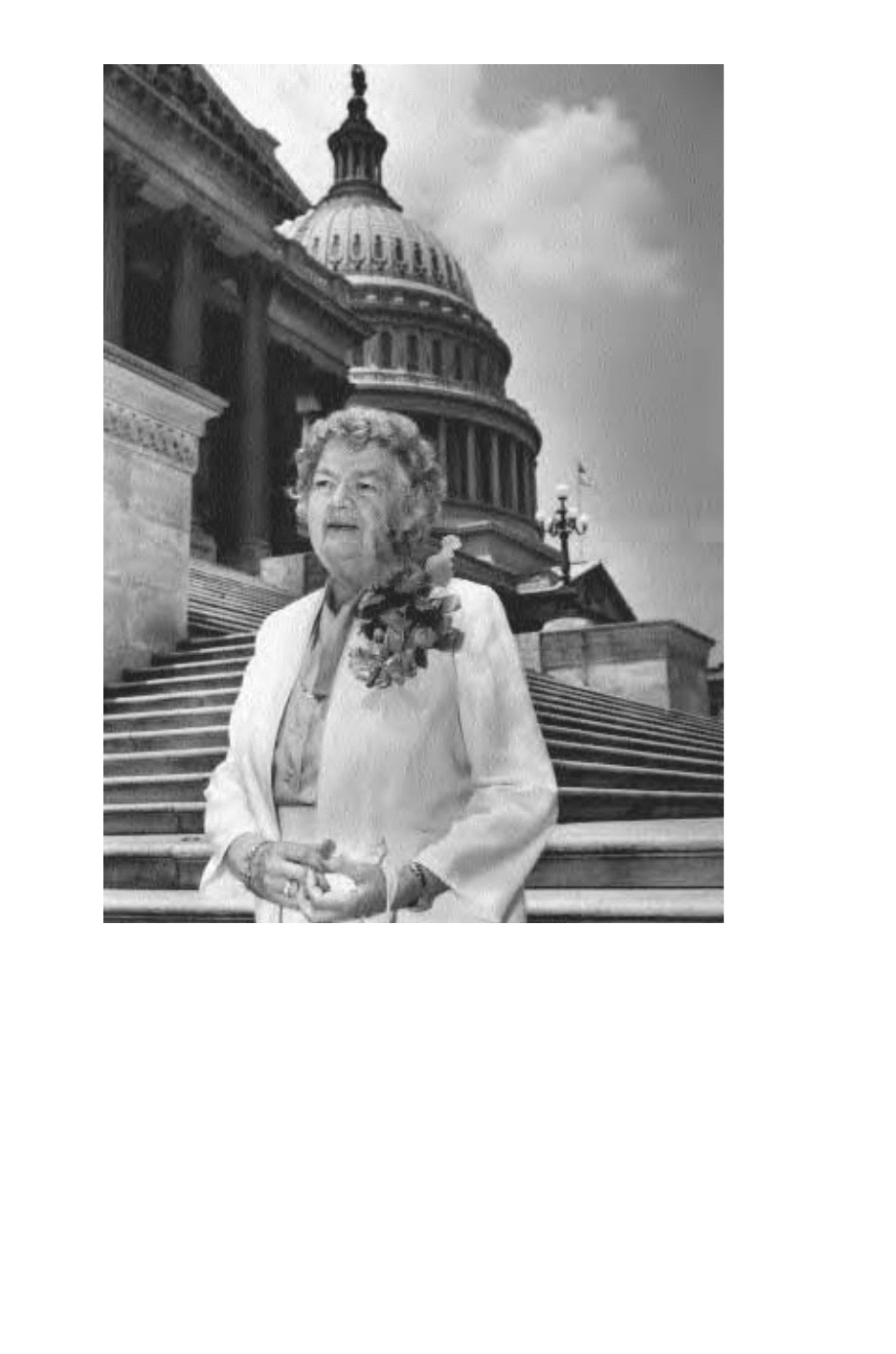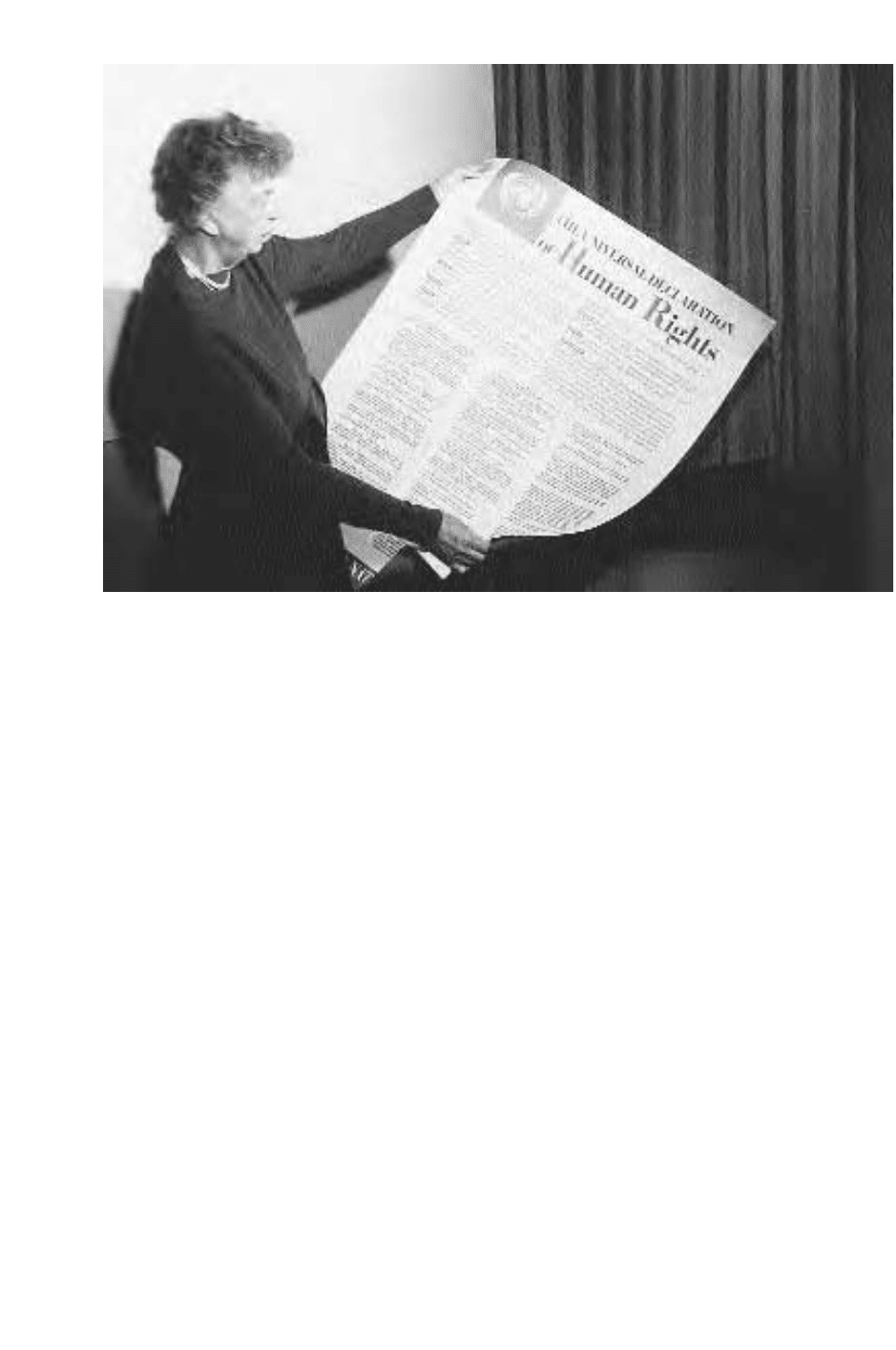Schenken Suzanne O’Dea. From Suffrage to the Senate: An Encyclopedia of American Women in Politics (2 Volumes)
Подождите немного. Документ загружается.


and received an appointment on the committee. In 1980, she won a seat
in the Oregon House of Representatives, served in the body from 1981 to
1985, and became the state’s first woman majority leader in 1983. Elected
secretary of state in 1984, she won reelection in 1988. As secretary of state,
Roberts sponsored election reform legislation, policies to ensure polling
places’ accessibility to people with disabilities, and construction of a new
state archives building.
Born in Corvallis, Oregon, Roberts attended Portland State Univer-
sity, Marylhurst College, and the John F. Kennedy School of Government
at Harvard University.
See also Governors, Women; State Legislatures, Women in
References Mullaney, Biographical Directory of the Governors of the United States
1988–1994 (1994); Roberts, “Coloring Outside the Lines” (1998).
Robertson, Alice Mary (1854–1931)
Republican Alice Robertson of Oklahoma served in the U.S. House of
Representatives from 4 March 1921 to 3 March 1923. She campaigned
with the slogan “Christianity, Americanism, Standpattism.”
Even though she had opposed woman suffrage and had served as
vice president of the state antisuffrage league, she ran for Congress in the
first election following the ratification of the Nineteenth Amendment.
Robertson pledged to help farmers, women, and soldiers during her 1920
campaign.
In Congress, she opposed the Sheppard-Towner Maternity and In-
fancy Protection Act of 1921, a measure that funded maternity and infant
care and was a key piece of legislation advocated by suffragists. Robertson
attacked the measure, describing it as paternalistic, a threat to the American
family, and Bolshevistic. She argued that it provided only instruction, which
she interpreted as propaganda. Robertson supported limiting immigration,
saying: “We are taking in foreign people so rapidly that we cannot Ameri-
canize them. Too many are here already who do not appreciate American
liberties and are doing their best to tear the nation down.” Despite a cam-
paign promise to support veterans, Robertson opposed the veterans’ bonus
bill, saying the nation could not afford it. Her constituents protested her op-
position to the bill by defeating her in the 1922 general elections.
After her defeat, Robertson said that politics was too rough and im-
moral for women, and she willingly retired. President Warren Harding ap-
pointed her a social worker at the Veterans Hospital in Muskogee, Okla-
homa, in 1923. She left after a few months and became the Washington
correspondent for the Muskogee News and then worked for the Oklahoma
Historical Society.
Robertson, Alice Mary 579

The daughter of missionaries, Robert-
son was born at Tullahassee Mission, Creek
Nation, Indian Territory (now Oklahoma).
After attending Elmira College from 1871
to 1873, she was a clerk in the Office of In-
dian Affairs from 1873 to 1879, and she
taught school at Tullahassee and then at
Carlisle Indian School. From 1885 to 1899,
Robertson was the administrator of the
Oklahoma Indian Territory Girls’ School, a
Presbyterian boarding school for girls. It
became the Henry Kendall College, a coed-
ucational facility, in 1894. She supervised
Creek Indian schools from 1900 to 1905
and then became a postmaster until 1913.
She wrote Alice Mary Robertson of Okla-
homa (1912).
See also Congress, Women in; Sheppard-Towner
Maternity and Infancy Protection Act of 1921;
Suffrage
References Office of the Historian, U.S. House of
Representatives, Women in Congress, 1917–1990
(1991); Stanley, “Alice M. Robertson, Oklahoma’s
First Congresswoman” (1967).
Robinson, Ruby Doris Smith (1941–1967)
A founding member of the Student Nonviolent Coordinating Committee,
Ruby Robinson served as its executive secretary from 1966 to 1967. She
began her civil rights activism as a college sophomore, participating in a
lunch-counter sit-in in Greensboro, North Carolina, and in other demon-
strations at restaurants to protest segregation. In April 1960, she attended
the meeting at Shaw University that led to the formation of the Student
Nonviolent Coordinating Committee (SNCC).
In 1961, Robinson joined other SNCC members in Rock Hill, South
Carolina, where she sat at a segregated lunch counter and was arrested
with three of her companions. Sentenced to thirty days in jail, she refused
bail in order to further focus attention on segregation and served her
term. It was the first time that civil rights workers arrested for this viola-
tion chose to serve the full sentence rather than post bail. She was arrested
in Jackson, Mississippi, for attempting to use a white restroom. Charged
with breaching the peace, she was given a suspended sentence and fined
$200, but refused to pay the fine. She spent two weeks in a county jail with
580 Robinson, Ruby Doris Smith
Representative Alice
Mary Robertson
(R-OK) who opposed
woman suffrage, ran
for Congress the same
year women got the
vote, 1920 (UPI/
Corbis)

as many as twenty-three others and then was sent to the maximum secu-
rity area of the Parchman State Penitentiary for forty-five days.
During the summer of 1961, Robinson participated in a voter regis-
tration drive in McComb, Mississippi, and attended a training seminar at
Fisk University. The next summer, she worked with the SNCC project in
Cairo, Illinois, and in the fall joined SNCC as a full-time administrative
assistant to the executive secretary. She organized student volunteers, as-
sisted the field staff, and handled emergencies. By 1962, she had also be-
come one of the organization’s intellectual leaders and one of its most
dedicated administrators. Elected executive secretary of SNCC in 1966,
she had come to believe that the movement needed to alter its focus from
civil rights legislation to fundamental socioeconomic change. Early in
1967, Robinson became terminally ill with a form of blood cancer. She
died in October 1967.
Born in Atlanta, Georgia, Robinson enrolled in Spelman College in
1959 and received her bachelor of science degree from that institution
in 1965.
See also Civil Rights Movement, Women in the
References Hardy, American Women Civil Rights Activists (1993).
Roe v. Wade (1973)
In Roe v. Wade, the U.S. Supreme Court declared invalid all state laws re-
stricting abortion in the first three months of pregnancy, using the right
of privacy as the basis for the decision. In this case, Jane Roe, later identi-
fied as Norma McCorvey, a single, pregnant woman living in Texas,
wanted a legal abortion, but Texas law at the time permitted legal abor-
tions only if the life of the mother was endangered by the pregnancy. Roe’s
pregnancy did not appear to endanger her life, so if she had obtained an
abortion in Texas, it would have been a criminal act. Roe argued that the
law was unconstitutionally vague and infringed on her right of privacy, a
right that she asserted was protected by the First, Fourth, Fifth, Ninth, and
Fourteenth Amendments.
The decision, written by Justice Harry Blackmun, reviewed English
common law, early abortion legislation from the colonial period to the
time of the decision, the American Medical Association’s involvement in
abortion, the American Bar Association’s positions on abortion law, and
other historical considerations. He noted three explanations for the crim-
inalization of abortion: (1) the laws were an attempt by nineteenth-cen-
tury Victorians to discourage illicit sexual conduct; (2) the laws attempted
to protect women from the dangers of abortion that existed during the
nineteenth century when most of the laws were enacted; and (3) the state
Roe v. Wade 581

had an interest in protecting maternal and fetal life. On the first point, he
accepted the argument that the Texas law was too broad and was not a
proper state purpose. On the second point, he noted improved medical
practices that reduced the dangers of infection but indicated that the state
has a role to play in protecting women’s health and safety. On the third
point, he wrote that the state may have interests beyond the protection of
the woman that include protecting fetal life after viability (sometime dur-
ing the third trimester).
Blackmun pointed out that the U.S. Constitution does not explicitly
mention a right of privacy but that the Court had recognized certain areas
of privacy. He suggested that it might be found in the Fourteenth Amend-
ment’s statements on personal liberty and its restrictions on state action or
in the Ninth Amendment’s reservation of rights to the people. Regardless
of its constitutional basis, Blackmun wrote that it “is broad enough to en-
compass a woman’s decision whether or not to terminate her pregnancy.”
Limitations on the right existed, however. During the first trimester,
abortions could be performed without state interference. After the first
trimester, a state could regulate abortion to protect the woman. After fetal
viability, the state had permission to regulate or prohibit abortion, except
when the mother’s health or life was endangered by her pregnancy. The
decision invalidated the Texas abortion statutes as well as those in other
states that limited women’s access to the procedure.
In a companion case, Doe v. Bolton, the Court struck down portions
of a Georgia law relating to the requirements that abortions must be per-
formed in accredited hospitals, that abortions must be approved by med-
ical committees, and that only residents of the state could obtain abor-
tions. The Court did not address the question of when life begins but did
note that the Fourteenth Amendment’s use of the word person does not
include the unborn.
See also Abortion; Akron v. Akron Center for Reproductive Health; Beal v. Doe;
Bellotti v. Baird; Bray v. Alexandria Clinic; Colautti v. Franklin; Doe v. Bolton;
Harris v. McRae; Hodgson v. Minnesota; Ohio v. Akron Center; Planned Parent-
hood Association of Kansas City, Mo. v. Ashcroft; Planned Parenthood of Central
Missouri v. Danforth; Poelker v. Doe; Rust v. Sullivan; Thornburgh v. American
College of Obstetrics and Gynecology; Webster v. Reproductive Health Services;
Williams v. Zbaraz
References Harrison and Gilbert, eds., Abortion Decisions of the United States
Supreme Court: The 1970s (1993).
Rogers, Edith Frances Nourse (1881–1960)
Republican Edith Rogers of Massachusetts served in the U.S. House of
Representatives from 30 June 1925 to 10 September 1960. Rogers began her
582 Rogers, Edith Frances Nourse

public life through her husband John Rogers, who entered Congress in
1913. When he went to Britain and France on a congressional mission dur-
ing World War I, Edith Rogers accompanied him. In England, Edith Rogers
volunteered for the Young Men’s Christian Association, and in Europe she
went to battle zones as a member of a Red Cross party, visiting base and
field hospitals. When she returned to the United States, she worked seven
days a week at Walter Reed Hospital. In 1922, President Warren G. Hard-
ing appointed her a dollar-a-year veterans’ hospital inspector, an appoint-
ment renewed by Presidents Calvin Coolidge and Herbert Hoover.
In March 1925, John Rogers died in office following an operation. At
the requests of veterans, family members, and Republican leaders, Edith
Rogers, Edith Frances Nourse 583
Representative Edith
Nourse Rogers
(R-MA) served for
twenty-eight years in
Congress, 1953 (UPI/
Corbis)

Rogers became a candidate to fill the vacancy. Congresswoman Rogers
warned Americans about the threat that Hitler posed, argued for military
preparedness, and supported U.S. entry into World War II. In 1942, she
sponsored the legislation that created the Women’s Army Auxiliary Corps
(WAACs), which eventually had 150,000 members, the legal limit. Later,
the word auxiliary was dropped, and the acronym became WAC.
Throughout her political career, Rogers served on the Veterans Af-
fairs Committee, chairing it in 1947. She once said that helping veterans
was her “greatest interest in life.” She cosponsored the GI Bill of Rights and
sponsored the Korean Veterans Benefits bill, as well as passing measures to
develop prosthetic appliances and appropriating funds for automobiles
for amputees. She was affectionately called the “mother of veterans.”
Rogers also supported legislation to protect her district’s textile and
shoe manufacturing and food processing industries. She advocated protec-
tive tariffs for cotton mill owners and benefits for laborers, again reflecting
issues important to her district. Rogers died two days before the 1960 Mas-
sachusetts primary, in which she was a candidate for a nineteenth term.
Born in Saco, Maine, Edith Rogers attended a finishing school near
Paris and traveled in Europe before marrying John Jacob Rogers in 1907.
See also Congress, Women in; Equal Rights Amendment
References Kaptur, Women of Congress: A Twentieth-Century Odyssey (1996).
Roosevelt, Eleanor (1884–1962)
First lady from 1933 to 1945, Eleanor Roosevelt established herself as a
leader in her own right and became one of the most beloved women in the
country. Shy and self-conscious as a child, she matured into a force on the
national and international stages, respected by heads of state and blue-
collar workers. Her tenure as first lady was unlike that of any first lady be-
fore or since.
Born in New York City, she was the daughter of socially prestigious
families on both her mother’s side and her father’s side. After her mother
died when Roosevelt was eight, her maternal grandmother raised her. Iso-
lated and lonely, tutored at home until she was fifteen years old, she found
companionship when she attended a private girls’ school in England for
three years. After returning to the United States, she taught at a settlement
house. She married her fifth cousin Franklin Delano Roosevelt in 1905 in
a ceremony officiated by her uncle, President Theodore Roosevelt. Over
the next eleven years, she bore six children, one of whom died in infancy,
and managed her household.
Franklin Roosevelt’s 1921 bout with poliomyelitis left him unable to
walk and led Eleanor Roosevelt to her reluctant involvement in politics.
584 Roosevelt, Eleanor

After a family friend told her that her husband needed politics to help him
recuperate, she became the means for his return to political life. She be-
came increasingly active in women’s activities in the Democratic Party and
at one time knew every Democratic Party county chairperson in New York.
When Franklin Roosevelt ran for governor of New York in 1928, she played
a pivotal role in gaining women’s support for his candidacy. She also
headed the women’s organization for Democratic presidential nominee Al
Smith’s candidacy and recruited Molly Dewson to work on the campaigns.
The two women worked together to reelect Franklin Roosevelt governor of
New York in 1930 and to elect him president in 1932. In the 1930s and
1940s, Eleanor Roosevelt played significant roles in expanding women’s
opportunities and enhancing women’s status in the Democratic Party.
After Franklin Roosevelt became president, Eleanor Roosevelt resigned
herself to a life limited to social activities, but she soon had a more diverse
schedule. Because of her husband’s limited mobility, she traveled in his
place and reported her observations to him. She called them “go-and-see
journeys” and went to places and events that no one from the White House
had ever visited. She went down into coal mines, visited the cardboard
shacks of people living in Oklahoma, walked along the irrigation ditches in
California, and traveled through the Dust Bowl. She visited wartime Great
Britain and Guadalcanal. She also reported her experiences through her
speeches and her writings, including a column entitled “My Day.”
Roosevelt, Eleanor 585
First Lady and
Ambassador Eleanor
Roosevelt dedicated
her life to the human
rights of all people
and helped pass the
United Nations
Universal Declaration
of Human Rights in
1948 (Courtesy: Corel
Corporation)

Eleanor Roosevelt was the first president’s wife to hold a press con-
ference. Limited to women reporters, Roosevelt used the forum to intro-
duce women in the administration to the public, to discuss the adminis-
tration’s programs, and to comment on the effect that the Depression and
later World War II had on women.
Her stands on civil rights attracted publicity, criticism, and goodwill.
When the Daughters of the American Revolution refused the use of Con-
stitution Hall to African American singer Marian Anderson in 1939, Roo-
sevelt resigned from the organization. The same year, she attended the
Southern Conference on Human Welfare meeting in Birmingham, Al-
abama. Resisting the South’s segregation policies, she placed her chair so
that half of it was on each side of the color line. During World War II,
Roosevelt was one of the few voices calling for the United States to assist
Jewish refugees.
After her husband died in 1945, President Harry Truman appointed
her to the U.S. delegation to the United Nations, the only woman in the
delegation. She chaired the preliminary Commission on Human Rights
in 1946 and was elected chair of the commission after it became perma-
nent in 1947. She shaped much of the Universal Declaration of Human
Rights that the UN General Assembly passed in 1948. When Truman left
office in 1953, she left the United Nations at the same time. President
John Kennedy reappointed her to the U.S. delegation to the United Na-
tions in 1961.
President John F. Kennedy appointed her chair of the President’s
Commission on the Status of Women in 1961. She died before the com-
mission completed its work.
See also Anderson, Marian; Democratic Party, Women in the; Dewson, Mary
(Molly) Williams; President’s Commission on the Status of Women
References Cook, Eleanor Roosevelt, vol. 1: 1884–1933 (1992); Lash, Eleanor:
The Years Alone (1972); Roosevelt and Hickok, Ladies of Courage (1954).
Ros-Lehtinen, Ileana (b. 1952)
Republican Ileana Ros-Lehtinen of Florida entered the U.S. House of Rep-
resentatives on 29 August 1989. She is the first Hispanic woman and the
first Cuban American elected to Congress. The first Hispanic elected to
the Florida legislature, Ros-Lehtinen served in the Florida House of Rep-
resentatives from 1982 to 1986 and the Florida Senate from 1986 to 1989.
She played key roles in the passage of victim rights’ legislation, drug-free
workplace measures, and tuition assistance programs. She left the state
Senate after winning the special election to fill the vacancy created by the
death of incumbent Claude Pepper.
586 Ros-Lehtinen, Ileana

A conservative, Ros-Lehtinen op-
poses reproductive rights and supports a
constitutional amendment banning flag
desecration. She has, however, objected to
her party’s anti-immigrant stand and de-
fended immigrants, saying they have
“contributed greatly to all facets of life in
the economic, cultural, and political
fields.” A former Cuban refugee, Ros-
Lehtinen has called Fidel Castro an “inhu-
man tyrant” and has advocated policies to
end his leadership in Cuba and replace it
with a democracy. She has also taken
strong stands in support of Israel.
Born in Havana, Cuba, Ileana Ros-
Lehtinen fled with her parents to Miami
in 1960, a year after Fidel Castro’s revolu-
tion. She earned her associate of arts de-
gree from Miami-Dade Community College in 1972. She completed her
bachelor of arts degree in 1975 and master of science degree in 1986 from
Florida International University. A schoolteacher, Ros-Lehtinen is the
founder and former owner of a private elementary school.
See also Congress, Women in; State Legislatures, Women in
References Congressional Quarterly, Politics in America 1994 (1993), Politics
in America 1998 (1997); www.house.gov/ros-lehtinen/bio.htm.
Ross, Nellie Tayloe (1876–1977)
Democrat Nellie Tayloe Ross was the first woman governor in the United
States, serving from 1925 to 1927, and she was the first woman director of
the U.S. Mint. After her husband, Wyoming governor William Bradford
Ross, died in 1924 with two years left in his term, Nellie Tayloe Ross won
the special election to complete the term. As governor, she changed law
enforcement commissioners three times in attempts to place a person in
office who would enforce Prohibition laws. Protecting water for irrigation
was another priority, as was protecting bank deposits threatened by bank
closures. Ross ran for reelection in 1926 but lost.
In 1928, she became vice chair of the Democratic National Commit-
tee. For the next four years, she directed women’s activities within the
party. She also became a friend and colleague of Eleanor Roosevelt. When
Franklin D. Roosevelt ran for president, Ross directed women’s efforts
during his 1932 campaign.
Ross, Nellie Tayloe 587
Representative Ileana
Ros-Lehtinen (R-FL)
spoke on the floor
during the House
debate on the four
articles of impeach-
ment against Presi-
dent Bill Clinton
(Associated
Press/APTN)

Roosevelt named Ross director of the U.S. Mint in 1933. With the
first signs of economic recovery in the mid-1930s, demand for coins in-
creased steadily and with it the need for increased facilities, equipment,
and staff. Three new mints were constructed, and the number of person-
nel more than trebled. In addition, the U.S. Bullion Depository at Fort
Knox, Kentucky, the U.S. Bullion Depository at West Point, New York, the
Mint building in San Francisco, and the Denver Mint were constructed
during her tenure.
During World War II, metal shortages led to the use of substitute
metals for coins, including the steel penny, which looked so much like
dimes that Ross ended the use of them in 1943. She said: “That awful ‘war
penney’ almost ruined our reputation, but nobody disliked it more than
we did at the Mint.” Ross oversaw the development of the Roosevelt dime
and the replacement of the buffalo nickel with the Jefferson nickel.
Born in St. Joseph, Missouri, Ross obtained her education in private
schools in Omaha, Nebraska.
See also Governors, Women
References Donaldson, “The First Woman Governor” (1926); H. W. Wilson,
Current Biography: Who’s News and Why, 1940 (1940); New York Times, 21 De-
cember 1977.
Roukema, Margaret Scafati (b. 1929)
Republican Margaret Roukema of New Jersey entered the U.S. House of
Representatives on 3 January 1981. She lost her first attempt to win a seat
in Congress in 1978 and then won on her second attempt in 1980. Con-
gresswoman Roukema was a stalwart supporter of the Family and Med-
ical Leave Act of 1993. Calling it a “bedrock family issue,” she worked on
it for eight years, despite President George Bush’s veto of the bill on two
occasions, in 1990 and 1992. Some of her commitment to the measure
arose from personal experience. She had left her academic pursuits in
1976 to care for her seventeen-year-old son who was dying of leukemia.
She posed the question: “What would I have done if not only did I have
the tragedy of and trauma of caring for my child, but also had to worry
about losing a job and the roof over my head?” The bill passed a third time
in 1993, and President Bill Clinton signed it.
Roukema was a key leader in the development and passage of the
Family Support Act of 1988 and the Child Support Enforcement Amend-
ments of 1984. She served on the U.S. Commission on Interstate Child
Support, incorporating legislation resulting from the commission’s work
into the Personal Responsibility and Work Opportunity Reconciliation
Act of 1996.
588 Roukema, Margaret Scafati
